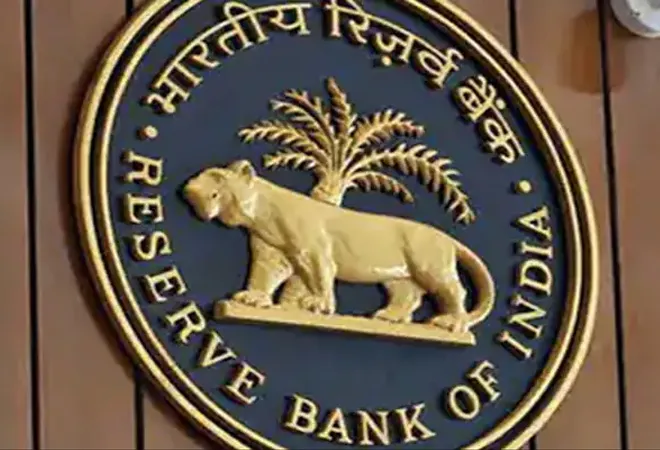
The Reserve Bank of India’s (RBI) recent report on
Currency and Finance for the financial year (FY) 2022-23, had a focus on '
Towards a Greener Cleaner India'. India has been at the forefront of sustainable development, despite the challenge of lack of adequate climate financing. India has been ambitious in its climate actions and has taken bold policy steps towards its Net Zero goals. This report of the RBI only further cements this reputation. With a focus on achieving a greener and cleaner India, the report outlines a comprehensive roadmap for transitioning towards a more sustainable and environment-friendly economy.
The report highlights the need for sustainable development practices in the country, with a particular emphasis on reducing carbon emissions and conserving natural resources. This detailed report covers multiple variables in the climate change conversation, with the intent to provoke thought leadership and ideation and efforts to proactively think about potential challenges to the high growth trajectory for India. This includes the pace of climate change, as much as its macroeconomic impact. It also raises caution on how these could impact financial stability and details climate risks.
With a focus on achieving a greener and cleaner India, the report outlines a comprehensive roadmap for transitioning towards a more sustainable and environment-friendly economy.
The report highlights the importance of sustainability and the need for a transition towards a more sustainable and environment-friendly economy. It discusses the role of the financial sector—including each of the sub segments like banks, NBFCs, insurance, asset management—in supporting a sustainable economy at an affordable cost of transition. Critically, this report is a clarion call for financial institutions to bring environmental, social, and governance (ESG) thinking into their decision-making processes and in assessing the long-term sustainability of businesses and investments. The RBI's push for ESG considerations is in line with global trends, as more and more investors are demanding that companies
disclose their ESG performance.
The report acknowledges that India stares at multiple environmental challenges, including pollution, deforestation, and climate change, and cautions that these will have large economic and social implications, and that addressing them will require a coordinated effort from government, industry, and civil society. The report also highlights the economic and social implications of India's environmental challenges. There have been other studies that have shown the linkages of
air pollution to an increase in respiratory diseases, and that
water pollution has led to a decline in the availability of safe drinking water. These challenges not only affect the health and well-being of Indians but also have
significant economic costs.
This report is a start for policymakers to have a shared plan for the climate transition. The need is evident for robust policy interventions without giving up economic growth, which will work towards the Indian green transition targets by 2030 and later make the
net zero goal by 2070 a realistic operational path. The RBI has mooted a few monetary measures to prevail on the continued resources flow to
energy efficient sectors. It has also suggested opening a window to offer low-cost funds to banks for their onward lending to help lower the borrowing costs of firms operating in the renewable energy space. In addition, it has articulated the need and reasoning for lower reserve requirements for lending to green projects.
The RBI's push for ESG considerations is in line with global trends, as more and more investors are demanding that companies disclose their ESG performance.
“India’s green financing requirement is estimated to be at least 2.5 percent of gross domestic product (GDP) annually till 2030.” For India to achieve its net zero target by 2070, the country would require a reduction in the energy intensity of GDP by around 5 percent annually until it is achieved. In addition, it would also have to deliver an energy mix of renewables at 70 percent by 2070-71, from the current 5.5 percent.
The report also highlights the importance of green finance in supporting sustainable development. The RBI notes that green finance can play a significant role in funding renewable energy projects, energy-efficient buildings, and sustainable transport systems. The report emphasises the need for financial institutions to develop green finance products and services to support the transition towards a more sustainable economy. This emphasis on green finance is a welcome development, as it not only supports sustainable development but also opens up new avenues for investment. In addition, the report brings the idea of using digital technologies to play a significant role in reducing carbon emissions and improving energy efficiency. This emphasis on digital technologies is particularly relevant as we continue to see the world transition towards a more digital economy. This is relevant for India as it champions its digital stack, as well as builds on its digital public goods. As a starter, the RBI is piloting the usage of
CBDC,
both in B2B and B2C context, for reducing paper currencies.
To promote sustainable development, the RBI recommends a number of policy interventions, including the adoption of renewable energy sources, the promotion of energy-efficient technologies, and the development of green infrastructure. It also highlights the need for greater investment in research and development to support the development of new, sustainable technologies. As policy peg, the RBI also brings about the importance of
financial inclusion in promoting sustainable development. It notes that access to financial services can help individuals and communities invest in sustainable technologies and practices, and can also facilitate the development of new, green businesses.
The RBI notes that green finance can play a significant role in funding renewable energy projects, energy-efficient buildings, and sustainable transport systems.
Another key observation in the report is the importance of sustainable agriculture and natural resource management. The report notes that
India is one of the world’s largest agricultural producers and that sustainable agriculture practices can help protect and balance natural resources and also to reduce greenhouse gas emissions. The report recommends the adoption of sustainable agricultural practices, such as conservation agriculture and organic farming, to promote sustainable development in the agricultural sector. With agriculture and rural development being critical for achieving sustainable development goals, the RBI’s push for financial institutions to support sustainable agriculture practices and rural development initiatives is crucial. This support can help create more sustainable livelihoods and improve the standard of living for rural communities.
In all, this report is a thought leadership push for policymakers, businesses, and civil society to work together to address India's environmental challenges. After all,
climate adaptation as well as mitigation needs an understanding of climate risks and
sustainable financing.
The views expressed above belong to the author(s). ORF research and analyses now available on Telegram! Click here to access our curated content — blogs, longforms and interviews.



 The Reserve Bank of India’s (RBI) recent report on Currency and Finance for the financial year (FY) 2022-23, had a focus on '
The Reserve Bank of India’s (RBI) recent report on Currency and Finance for the financial year (FY) 2022-23, had a focus on ' PREV
PREV

